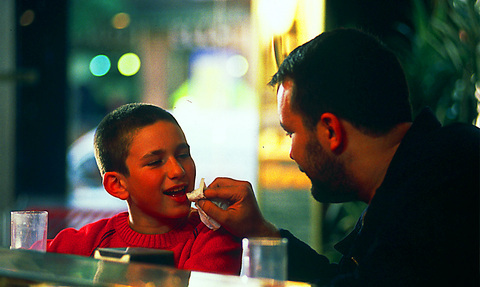What happens when a sexually free-spirited, HIV-positive dentist becomes the unofficial custodian of his 9-year-old nephew? That's the question posed by Bear Cub, a wise, sweet-natured Spanish film, in which an uncle, Pedro (Jose Luis Garcia-Perez), takes in his smart, very hip young nephew Bernardo (David Castillo) after Bernardo's mother is detained abroad.
Pedro is a denizen of Madrid's "bear" subculture of proudly paunchy gay men who don't shave their bodies and who refuse to cultivate the chiseled Calvin Klein ideal of eternal boyishness.
Bernardo is precociously attuned to the lifestyles of urban sophisticates. His widowed mother (and Pedro's older sister), Violeta (Elvira Lindo), is a high-strung, superannuated hippie who leaves Bernardo with his uncle when she impulsively decides to take a two-week jaunt to India with her latest boyfriend. When Violeta is arrested at the border for drug trafficking and held in jail indefinitely, Pedro's babysitting duties become temporary guardianship.

PHOTO COURTESY OF TLA RELEASING.
If Bear Cub were an American movie or television play, you can bet it would be puritanically wringing its hands over Pedro's supposed inappropriateness as a guardian and role model, not to mention the possible health risks Bernardo faces living with an HIV-infected relative. It would probably involve a fierce court battle, a death scene and a final, tearful reunion between the son and his morally chastened mother.
But Bear Cub calmly defies expectations at every turn. It opens with a fairly graphic gay threesome. It goes out of its way to portray HIV infection as something other than a death sentence. It also explores Pedro's relationship with a flight attendant and part-time lover who wants a full-time commitment that Pedro is unwilling to make. It even follows Pedro to a gay bathhouse.
The movie brings in a potential villain in Violeta's widowed, estranged mother-in-law, Dona Teresa (Empar Ferrer), a lonely old woman who blames Violeta for her son's drug-related death. Eager to re-establish a family connection, Dona Teresa wants to take over Bernardo's upbringing and send him to a good school. But Pedro and his nephew have formed a strong attachment, and the boy is reluctant to leave his uncle. A legal battle ensues, but there is no high drama.
The film, directed by Miguel Albaladejo, who wrote the screenplay with Salvador Garcia, refuses to demonize the grandmother, even though she is ruthless enough to have Pedro followed and to obtain his medical records to bolster her cause.
In his casual but deeply caring way, Pedro is a responsible guardian. When he sternly scolds a friend for rolling a joint in front of Bernardo, the boy chimes in and admits that he has rolled many joints for his mother.
Without the endearing, canny performance of Castillo, whose Bernardo is still a child beneath his wised-up shell, Bear Cub might have been an uncomfortably gooey uncle-and-moppet odd-couple comedy.
And at the end, Bear Cub does have a brush with sentimentality. But by then, its integrity and low-key truthfulness has been certified in a dozen different ways.

In the March 9 edition of the Taipei Times a piece by Ninon Godefroy ran with the headine “The quiet, gentle rhythm of Taiwan.” It started with the line “Taiwan is a small, humble place. There is no Eiffel Tower, no pyramids — no singular attraction that draws the world’s attention.” I laughed out loud at that. This was out of no disrespect for the author or the piece, which made some interesting analogies and good points about how both Din Tai Fung’s and Taiwan Semiconductor Manufacturing Co’s (TSMC, 台積電) meticulous attention to detail and quality are not quite up to

April 21 to April 27 Hsieh Er’s (謝娥) political fortunes were rising fast after she got out of jail and joined the Chinese Nationalist Party (KMT) in December 1945. Not only did she hold key positions in various committees, she was elected the only woman on the Taipei City Council and headed to Nanjing in 1946 as the sole Taiwanese female representative to the National Constituent Assembly. With the support of first lady Soong May-ling (宋美齡), she started the Taipei Women’s Association and Taiwan Provincial Women’s Association, where she

It is one of the more remarkable facts of Taiwan history that it was never occupied or claimed by any of the numerous kingdoms of southern China — Han or otherwise — that lay just across the water from it. None of their brilliant ministers ever discovered that Taiwan was a “core interest” of the state whose annexation was “inevitable.” As Paul Kua notes in an excellent monograph laying out how the Portuguese gave Taiwan the name “Formosa,” the first Europeans to express an interest in occupying Taiwan were the Spanish. Tonio Andrade in his seminal work, How Taiwan Became Chinese,

Mongolian influencer Anudari Daarya looks effortlessly glamorous and carefree in her social media posts — but the classically trained pianist’s road to acceptance as a transgender artist has been anything but easy. She is one of a growing number of Mongolian LGBTQ youth challenging stereotypes and fighting for acceptance through media representation in the socially conservative country. LGBTQ Mongolians often hide their identities from their employers and colleagues for fear of discrimination, with a survey by the non-profit LGBT Centre Mongolia showing that only 20 percent of people felt comfortable coming out at work. Daarya, 25, said she has faced discrimination since she